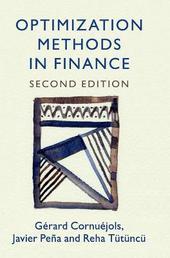
|
Optimization Methods in Finance
Hardback
Main Details
| Title |
Optimization Methods in Finance
|
| Authors and Contributors |
By (author) Gerard Cornuejols
|
|
By (author) Javier Pena
|
|
By (author) Reha Tutuncu
|
| Physical Properties |
| Format:Hardback | | Pages:348 | | Dimensions(mm): Height 253,Width 178 |
|
| Category/Genre | Finance
Business mathematics and systems
Applied mathematics |
|---|
| ISBN/Barcode |
9781107056749
|
| Classifications | Dewey:332.015195 |
|---|
| Audience | | Undergraduate | | Professional & Vocational | |
|---|
| Edition |
2nd Revised edition
|
| Illustrations |
Worked examples or Exercises; 13 Halftones, black and white; 21 Line drawings, black and white
|
|
Publishing Details |
| Publisher |
Cambridge University Press
|
| Imprint |
Cambridge University Press
|
| Publication Date |
9 August 2018 |
| Publication Country |
United Kingdom
|
Description
Optimization methods play a central role in financial modeling. This textbook is devoted to explaining how state-of-the-art optimization theory, algorithms, and software can be used to efficiently solve problems in computational finance. It discusses some classical mean-variance portfolio optimization models as well as more modern developments such as models for optimal trade execution and dynamic portfolio allocation with transaction costs and taxes. Chapters discussing the theory and efficient solution methods for the main classes of optimization problems alternate with chapters discussing their use in the modeling and solution of central problems in mathematical finance. This book will be interesting and useful for students, academics, and practitioners with a background in mathematics, operations research, or financial engineering. The second edition includes new examples and exercises as well as a more detailed discussion of mean-variance optimization, multi-period models, and additional material to highlight the relevance to finance.
Author Biography
Gerard Cornuejols is a Professor of Operations Research at the Tepper School of Business, Carnegie Mellon University, Pennsylvania. He is a member of the National Academy of Engineering and has received numerous prizes for his research contributions in integer programming and combinatorial optimization, including the Lanchester Prize, the Fulkerson Prize, the Dantzig Prize, and the von Neumann Theory Prize. Javier Pena is a Professor of Operations Research at the Tepper School of Business, Carnegie Mellon University, Pennsylvania. His research explores the myriad of challenges associated with large-scale optimization models and he has published numerous articles on optimization, machine learning, financial engineering, and computational game theory. His research has been supported by grants from the National Science Foundation, including a prestigious CAREER award. Reha Tutuncu is the Chief Risk Officer at SECOR Asset Management and an adjunct professor at Carnegie Mellon University, Pennsylvania. He has previously held senior positions at Goldman Sachs Asset Management and AQR Capital Management focusing on quantitative portfolio construction, equity portfolio management, and risk management.
ReviewsReview of first edition: 'This book will be useful as a textbook for students in financial engineering at the MS level. ... The book will also be of interest to researchers and graduate students in optimization who are interested in applications of optimization to financial problems.' Brian Borchers, Journal of Online Mathematics and its Applications Review of first edition: 'This book would certainly appeal to someone with a mathematical background, perhaps in operations research, wishing to update and apply their knowledge to the financial world.' Mathematics TODAY Review of first edition: 'Until now, there has been no comprehensive optimization book aimed at quantitative analysts in the financial industry. The book by Cornuejols and Tutuncu fills this void ... an excellent source for quantitative financial analysts and graduate students to learn about basic optimization theory, computational methods, and available software. At the same time, it can be used by academic researchers and students in optimization as an introduction to various interesting problems in financial applications.' International Review of Economics & Finance
|